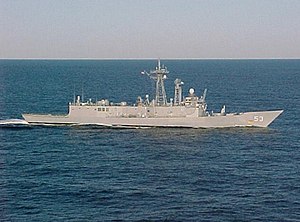USS Hawes
 USS Hawes (FFG-53)
| |
| History | |
|---|---|
| Name | Hawes |
| Namesake | Rear Admiral Richard E. Hawes |
| Awarded | 22 May 1981 |
| Builder | Bath Iron Works, Bath, Maine |
| Laid down | 26 August 1983 |
| Launched | 18 February 1984 |
| Sponsored by | Mrs. Ruth Hawes Watson |
| Commissioned | 9 February 1985 |
| Decommissioned | 10 December 2010 |
| Homeport | Norfolk, Virginia |
| Identification |
|
| Motto | "Ever Ready, Ever Fearless" |
| Status | Scrapped in Brownsville 2021 |
| General characteristics | |
| Class and type | Oliver Hazard Perry-class frigate |
| Displacement | 4,100 long tons (4,200 t), full load |
| Length | 453 feet (138 m), overall |
| Beam | 45 feet (14 m) |
| Draught | 22 feet (6.7 m) |
| Propulsion |
|
| Speed | over 29 knots (54 km/h) |
| Range | 5,000 nautical miles at 18 knots (9,300 km at 33 km/h) |
| Complement | 15 officers and 190 enlisted, plus SH-60 LAMPS detachment of roughly six officer pilots and 15 enlisted maintainers |
| Sensors and processing systems |
|
| Electronic warfare & decoys | AN/SLQ-32 |
| Armament |
|
| Aircraft carried | 2 × SH-60 LAMPS III helicopters |
| Aviation facilities | |
USS Hawes (FFG-53) is a later model Oliver Hazard Perry-class guided missile frigate. She is named for Rear Admiral Richard E. Hawes (1894–1968) who was twice decorated with the Navy Cross for submarine salvage operations.

Construction
The contract to build Hawes was awarded to Bath Iron Works, Bath, Maine, 22 May 1981, and her keel was laid 26 August 1983. She was launched 18 February 1984; sponsored by Mrs. Ruth H. Watson, widow of the late Rear Adm. Hawes; delivered 1 February 1985, and commissioned 9 February 1985, Commander Thomas F. Madden in command.[1]
Service history
On 12 October 2000, Hawes was involved, along with Donald Cook, in providing repair and logistics support to Cole, shortly after she was attacked in Aden, Yemen. Two al-Qaeda terrorists brought an inflatable Zodiac-type speedboat that carried a bomb alongside guided missile destroyer Cole, while the ship refueled, and detonated their lethal cargo, killing 17 sailors and wounding 42 more. The crewmember's heroic damage control efforts saved Cole. Hawes, Cmdr. J. Scott Jones in command, joined (13 October – October) other ships that took part in Operation Determined Response to assist Cole including: amphibious assault ship Tarawa; dock landing ship Anchorage; amphibious transport dock Duluth; guided missile destroyer Donald Cook; and the Military Sealift Command-operated tug Catawba; along with British frigates Cumberland and Marlborough. The Navy subsequently enhanced global force protection training during crucial transits, and sailors qualified to fire M60 and Browning .50 caliber M2 machine guns to defend against assaults by low-slow flying aircraft and small boats.[1]
Hawes, with Helicopter Antisubmarine Squadron (Light) HSL-48 Detachment 10 embarked, returned from a counter-narcotics deployment to the Caribbean and Western Atlantic to Naval Station Norfolk, Virginia, on 7 October 2009. The ship's operations resulted in the seizure of 200 barrels of cocaine.[1]
In July 2010, Hawes docked for five days at Pier 4 of the Charlestown Navy Yard, participating in a Navy Week coordinated alongside Boston's Harborfest.[2]
Hawes, operating with Destroyer Squadron 26 out of Norfolk, was decommissioned on 10 December 2010. She is moored, pending disposal, at the Naval Sea Systems Command (NavSea) Inactive Ships On-Site Maintenance Office, Philadelphia, Pennsylvania.[1]
References
- ^ a b c d Evans, Mark L. (14 July 2015). "Hawes (FFG-53)". Naval History and Heritage Command. Retrieved 8 January 2016.
- ^ The 2010 Boston Navy Week Schedule of Events
![]() This article includes information collected from the Naval Vessel Register, which, as a U.S. government publication, is in the public domain. The entry can be found here.
This article includes information collected from the Naval Vessel Register, which, as a U.S. government publication, is in the public domain. The entry can be found here.
![]() This article incorporates text from the public domain Dictionary of American Naval Fighting Ships. The entry can be found here.
This article incorporates text from the public domain Dictionary of American Naval Fighting Ships. The entry can be found here.
External links
- USS Hawes official website
- Photo gallery of USS Hawes (FFG-53) at NavSource Naval History
- navysite.de: USS Hawes
- Boothbay Register story, 24 June 1999
- MaritimeQuest USS Hawes FFG-53 pages
- USS Hawes Decommissioning story 12/11/2010
